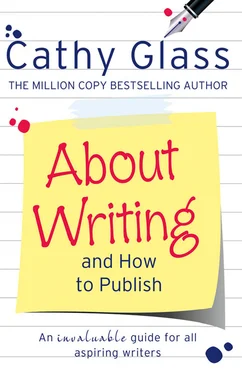This is what you do: choose a quiet place where you intend to write. It’s a good idea to use the same place (and time) each day for your writing so that you fall into a writing routine. I’ll explain more about that shortly. Now, pick up your pen or switch on your computer and, thinking of the story you want to write, start writing down the words that come into your head. Don’t worry if what you have written doesn’t make much sense, seems irrelevant or contains poor grammar; you’ll sort all that out later when you rewrite. The main objective has been achieved – you are writing. Let the words flow however they care to, just as they come. Then give yourself a pat on the back – the creative writing process has begun.
If nothing comes into your head then try one of the following exercises to kick-start your subconscious into action:
Think back to your earliest memory and describe the scene in a small paragraph (about six sentences). When you have finished that scene, add a ‘what if’. What if I had done or said this instead of that? What if I had taken a different route? What if that person hadn’t been there? Now write another small paragraph describing the outcome. This is obviously pure fantasy, so you are writing creatively, imaginatively and from your subconscious.
Once you’ve finished your ‘what if’, turn your thoughts to the story you want to write and construct a small paragraph applying the same ‘what if’ principle. The scene you choose doesn’t have to take place at the beginning of your book; just write whatever comes into your head. Well done, you are writing creatively.
Describe an object you can see; for example, a table or an apple in the fruit bowl. Imagine the person who made that object or picked the apple and write a paragraph about him or her. Obviously you are unlikely to know anything about that person, so you are writing creatively. Once the words are flowing, turn your thoughts to your story and write a paragraph as above, applying this imaginative approach to your characters.
Concentrating on one of your senses, describe what you can see, hear, smell, taste or touch. It can be just a short paragraph, and then, once you have written that, think of a scene in your story. What can your characters see, hear, smell, taste and touch? Well done, you are writing creatively.
I’ve used these techniques in my own writing in the past and also in writing groups. They do work, whatever genre you are working in. You may not need to use them, but if you are struggling to write that opening paragraph then try the above. Once you have started writing, keep going until the words stop and then finish for the day. You can check your work, but don’t try to force any more words from your imagination. That rush of creativity is always limited and if you try and force it to go further you’ll achieve little and may lose faith in what you have written. Three hours a day is my maximum for writing creatively, after which I may check over another document, answer emails, etc., but I do not attempt any more of that creative first draft. I imagine the process of creative writing as having a basket full of words and once that basket is empty I have to wait until the following morning for it to be replenished. Ernest Hemingway, writer and journalist, described it as a ‘well’ that refills overnight from the spring that feeds it. The creative process needs to be respected for its limitations, as much as for what it gives us.

The creative process is usually helped by having a writing routine: a place and time set aside for you to write and with a little ritual leading up to the writing. If you approach your writing in the same way every day, very soon you’ll find that by the time you sit down to write your subconscious will be fired up and ready to go. Your imagination will instantly start producing the words you need to write creatively. Like Pavlov’s dogs, which were trained to expect food and therefore salivate whenever they heard a bell ring, you can train your creative juices to start flowing on your command by following your writing routine. The process is called classical conditioning and is triggered by the ritual of your writing routine.
I’ve had the same writing routine for the last fifteen years: I rise early (at approximately the same time each morning), put on my joggers and a comfortable top and creep downstairs so I don’t disturb my family. I make a large mug of coffee and then go through to the front room where I collect my paper, pen and the text I’ve written the day before. I then go into the living room and quietly close the door. I sit in the same chair and, with my coffee within reach, I begin by reading what I’ve written the day before, editing as necessary. By the time I come to the end of the previous day’s work, my new words are ready to flow. I still use pen and paper for the first draft. I write very quickly, often unaware of my surroundings as my pen dashes across the page. As the author Ray Bradbury said: ‘My stories run up and bite me on the leg – I respond by writing down everything that goes on during the bite. When I finish, the idea lets go and runs off.’
I know exactly what this author means. When ‘the idea has run away’ and my basket of words is empty I type what I’ve written into my computer – first the revised draft from the day before, and then my new work. I print out the new pages ready for revising the following morning. This is my writing routine and it works for me. Your routine is likely to be different to mine, to suit your work and family commitments, and will also take into account when you are at your most creative. Some writers are early birds, like me; some are night owls, while a few lucky writers can turn on their creative juices at any time of the day or night. However, most writers (although not all) need silence and no interruptions while they are writing that first creative draft. I certainly do. I can’t even have music playing softly in the background while I’m concentrating. Stephen King, the bestselling author, calls it ‘the door closed’; that is to say his study door has to be closed against interruptions while he is writing creatively. You’ll soon discover the situation and time that suits you best and, once you do, I recommend that you keep to your routine. It will act as a catalyst for your day’s creative writing.
‘What shall I use to write?’
… Some people ask. You can use whatever you like for that first draft, which only you will see: pen and paper, Dictaphone or you can type it straight into the computer. However, if you are intending to publish your work, at some point you will need to type it into a word-processing document (such as Microsoft Word) so that it can be sent electronically by email. I explain about publishing in the third section of this book. Whatever medium you use for your writing, make sure you have at least one copy of your work. If you are using only pen and paper then I suggest you photocopy your work each day. Once your work is on the computer, back it up by saving it on a ‘memory stick’, a CD or to a ‘cloud’ – where a third party stores your data on the internet. I can’t emphasize enough how important it is to back up your work. You’ve invested a lot of time and energy in your story and paper copies can become lost or accidently thrown away, and computers do fail. I always have three copies of my work: the paper copy, on computer hard drive and on ‘memory stick’.
Конец ознакомительного фрагмента.
Читать дальше













